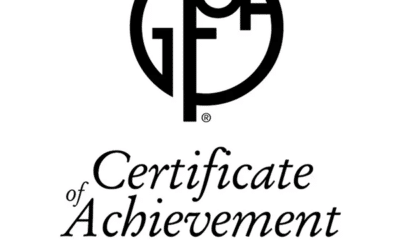Business
Fitness, Lift Yoga and How COVID-19 Has Evolved a Business [Podcast]
Published
5 years agoon
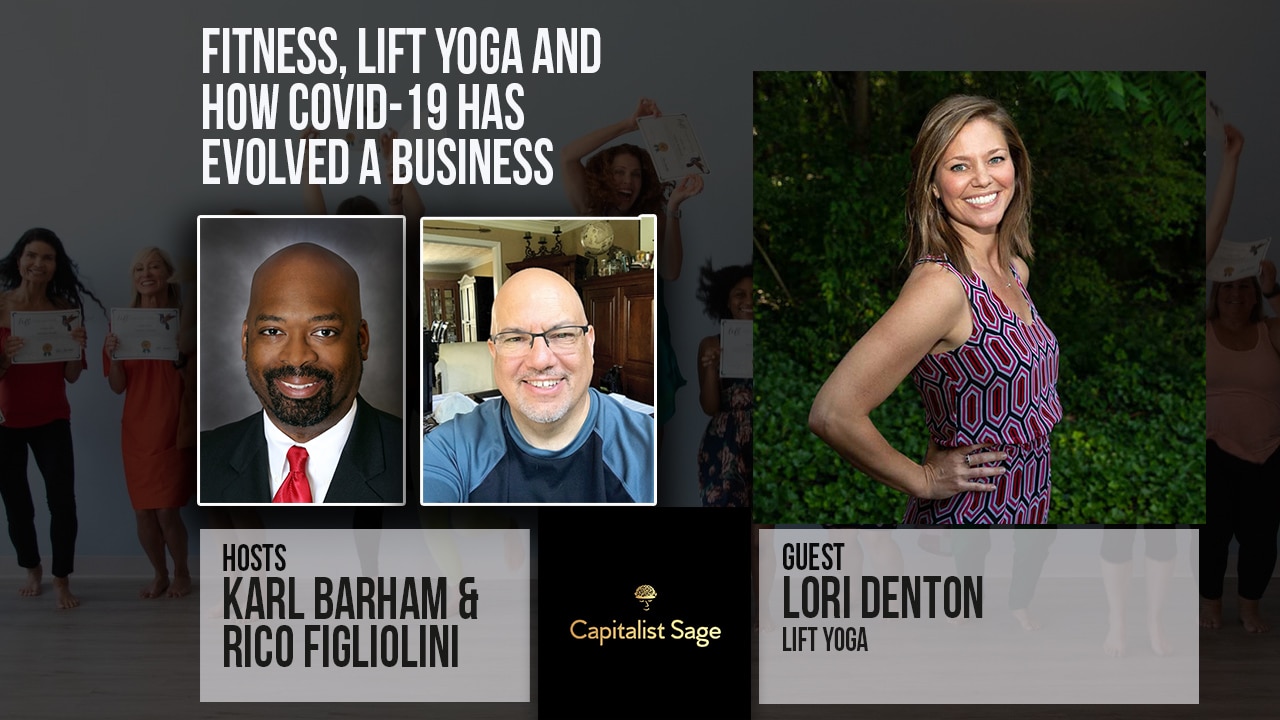
Owner Lori Denton Shares her Journey
On this brand new episode of the Capitalist Sage, Karl Barham and Rico Figliolini sit down with Lori Denton, owner of Lift Yoga and Body to talk about what business looks like in this new world. Lori has been able to figure out ways to work through the current COVID climate, listen in to find out how.
Timestamp (where topics appear in the program):
[00:00:30] – Intro
[00:02:41] – About Lori and Lift Yoga
[00:03:51] – The First Year
[00:06:09] – Why Yoga?
[00:08:25] – Starting from Scratch vs. Buying a Business
[00:09:53] – Work Balance
[00:10:55] – First Impressions of COVID
[00:13:12] – Opinions on Local Leadership
[00:15:57] – New Implementations
[00:19:35] – Coming Back to the Studio
[00:21:31] – Virtual Class Launch
[00:26:07] – How to Keep Moving
[00:28:48] – Serving the Community
[00:30:27] – Learning Opportunity
[00:31:34] – What’s Going On at Lift Yoga
[00:33:12] – Closing
Resources:
Website: https://liftyogastudio.com
Recorded socially safe online and in the City of Peachtree Corners, Georgia
“I couldn’t ask for a better staff than I have here at Lift Yoga. Everybody from the people that we have cleaning the rooms to our instructors, to our social media and photography resources. They’re just an amazing group of people and I couldn’t do it without them. So when they say it takes a village, I fully believe in that and they have done just wonders to help me balance that corporate life with the small business world.”
Lori Denton
Podcast Transcript:
Karl: [00:00:30] Welcome to the Capitalist Sage Podcast. We’re here to bring you advice and tips from seasoned pros and experts to help you improve your business. I’m Karl Barham with Transworld Business Advisors, and my cohost is Rico Figliolini with Mighty Rockets, Digital Marketing, and the publisher of the Peachtree Corners magazine. Hey, Rico, how’re you doing today?
Rico: [00:00:49] Good Karl. Beautiful day outside. I can see it from my window.
Karl: [00:00:53] It is, we are in August and things are going along. School’s coming back soon, all the very various versions of it. But why don’t you tell us about our sponsors for our episode today?
Rico: [00:01:05] Sure. Our lead sponsor is Hargray Fiber. Hargray Fiber is a company located in the Southeast and across the Southeast they’re a fiber optics company. They work with a lot of small businesses, as well as enterprise size businesses. Bring in cable optics, optic fiber, specifically, to be able to bring that into that connection to your home, if you’re teleworking, or to your businesses. They’re working with a lot of different companies across the Southeast here. They have a special promotion going on right now. So if you’re connecting, if you connect with heartbreak fiber this month, they have a thousand dollars gift card that would come to you, Visa gift card. So check them out, go to HargrayFiber.com or Hargray.com/business. And you’ll find out more about them. You can even call them at (866) 407-0104. Find out more about their services.
Karl: [00:01:59] Oh, fabulous. Thank you very much Rico and thank you Hargray Fiber for being a great partner in the community and the Capitalist Sage Podcast. Well today, we are excited to have our guest today, Lori Denton. Who is the owner of Lift Yoga and Body based in Alpharetta, Georgia. And today we’re going to talk about, how businesses, small businesses are navigating the COVID-19 pandemic. Talk a little bit of what it’s like after we’ve reopened. And some of the things people are doing to innovate and to thrive through this global pandemic that we’re all experiencing. Lori, how are you doing today?
Lori: [00:02:39] I’m great, thanks. How are you?
Karl: [00:02:41] Great. Why don’t we start off by you telling us a little a bit about yourself and how you got into Lift Yoga.
Lori: [00:02:50] Sure. So, I’m fairly new to the Atlanta region, I come from the DC area. And I’ve moved all over the country. I’ve had a good, career in business development. I’ve had the fortune of living a little bit of everywhere. So when I moved to the Atlanta area, I realized that there was a good business opportunity to create more of the yoga environment that I was used to finding elsewhere around the country where I’ve lived. So, as soon as I moved here I kinda started dreaming about owning a yoga studio in this area. And again, bringing that style of yoga here, and I had the good fortune last year to purchase Lift Yoga and Body, which I am coming to
you from live here. And it’s been in business for about seven years. Took it on last year and it’s been an interesting year I have to say, not what I expected in my first year of ownership, but it’s been a good learning experience. I’m just thrilled to be able to take on such a wonderful location.
Karl: [00:03:41] Oh, that’s fabulous. Why don’t you tell us again where is Lift Yoga located?
Lori: [00:03:44] Lift Yoga is in Alpharetta, Georgia. Just down the street from downtown Alpharetta. Very great location.
Karl: [00:03:51] Great. Alpharetta is in North Georgia and got a great location and a beautiful studio, what a great history there. So you’re experiencing your first of couple years in business. I’m curious, how was it when you, before COVID-19, some of the highlights in your first year, but what were some of the things that you learned and experienced in that first year?
Lori: [00:04:15] It was, business was great. You know, I focused a lot, I’m a big numbers dork. So I tried to focus a lot on the numbers and what the data was telling me about what people were looking for, what classes they were gravitating towards, what times and days really tried to dig into the data as much as possible. I’m also a big fan of surveys and keeping tabs on what our main members were looking for. So I did a lot of surveys, tried to figure out what they were looking for. And from July to February, our first time visitors doubled over the prior year. And we were able to increase retention rates by about 25%. So things were going great. And again, I think that’s because I listened a lot to what our members were looking for. I think that’s very important and also listen to what my staff was asking for and what they were hearing from the community. So I tried to keep as close to that as possible. And we were seeing some really good results, positive changes in the business because of it.
Karl: [00:05:12] So, where did you learn to do that? Cause when we talk to a lot of small business owners, we don’t often hear them using data, getting surveys, from there. Where’d you get some of those ideas and how did you find applying it in a small business situation?
Lori: [00:05:27] Yeah. So, and it was funny because, I got a funny reaction from a lot of my members and the staff when I started to talk about statistics and numbers and put out these surveys, they were kind of surprised to see that in this environment. But my background is in big corporate business development and product marketing. And so throughout my career, I have relied very heavily on data. That’s where I start. And then I try to pull out insights from that and then get the real life, personal, feedback from consumers in order to match that with the data and then move forward. So a lot of it just comes from my personal experience and background in business. And tried to apply as much as the best practices that I learned from that as possible to the small business.
Karl: [00:06:09] So I’m curious, what made you chose a fitness industry in general and yoga specifically? What connected you to that?
Lori: [00:06:17] You know, I believe a lot in doing what you love and I’ve practiced yoga for about 20 years now. So I am a Yogi at heart. And so it was very easy for me to transition into owning the business because I had personally experienced it. You know, like a lot of people are very successful owning businesses that they don’t know a lot about and bringing in consultants, I felt like this was space that I knew a lot about. I could provide a lot of personal experience and best practices that I had seen myself. And so that’s really why I was looking for something in the fitness industry to get into a small business.
Karl: [00:06:52] What do you see as some of the benefits when folks, you know, join or get involved in this type of fitness in general and yoga specifically. How is it really helping your clients and the folks that support your business?
Lori: [00:07:07] So that’s one of the reasons why I firmly believe that yoga is absolutely for every body. And I mean that truly every body, every type of person, every age range, every body type, because it has so many benefits from physical to mental. So and one of the reasons that attracted me to lift yoga specifically is many other studios have a very specific focus and only, may appeal to a specific target market. The brilliance of Lift Yoga, and I can say that because, the previous owner built a lot of that, so I don’t feel like I’m being conceited by saying that, but you know, the brilliance of it is that there’s such a wide range of types of yoga that we provide. So depending on how you’re feeling on any given day, we have the services that will match that need. So if you’ve had a really rough day and you just need to sweat it out, we have a hot power yoga for you. If you’ve had a super stressful day and all you need is to sit back and relax. We have yoga nidra, which is actually a guided meditative sleep. So there’s no movement. You lie there and somebody guides you through a meditation and it’s the most relaxing thing ever. And we have everything in between. And I think that’s very important because on any given day and I know I want to unwind in a different way than I did the day before. And we have something to fit every need.
Karl: [00:08:25] Often we talk to a lot of folks and their dream is to own and start a business. Why did you choose to acquire versus kind of start one from scratch? What was some of the things you considered and what do you think now that you’ve done that?
Lori: [00:08:40] Yeah. You know, there are lots of pros and cons of each. I think if I hadn’t found a good fit in an existing studio, then I would have looked to open my own. And you know, I don’t see the, the positive in acquiring a business and then doing a total overhaul. I think it has to be a good fit. And so it took a little while to look around the area and see what may be a good fit for me. And I think, again, that’s what has made it a very successful is that it already fit a lot of my needs. But overall, I think the thing that led me to acquiring a business versus starting from scratch is I have a full time job in another life, in my business development world. And the startup costs to completely build out a facility and find the right staff and find the membership base. I was looking at about a three year ramp up period when I did the full marketing plan to get to the place where the business already was. And so for me, it was worth it in order to
purchase the business that already had that established membership base and already had a phenomenal staff that was up and running and knew the inner workings of the business. That’s really what made the difference for me
Rico: [00:09:53] I was going to say, I have a question as well. You worked in the corporate world as well, right? Before this?
Lori: [00:09:59] Correct. Currently. Yep.
Rico: [00:10:01] Well, currently, even still. So how is that? How do you, how does that work with, you know, not only your lifestyle, but the fact that you have a job somewhere else? How does all that work? What’s the, is there stress level? Is there, where do you go with that?
Lori: [00:10:16] Yeah, so, and, you know, I’ll come back to the staff and again, that being a main reason why I look to acquire versus starting from scratch. I couldn’t ask for a better staff than I have here at Lift Yoga. Everybody from the people that we have cleaning the rooms to our instructors, to our social media and photography resources. They’re just an amazing group of people and I couldn’t do it without them. So when they say it takes a village, I fully believe in that and they have done just wonders to help me balance that corporate life with the small business world.
Karl: [00:10:55] You’re navigating that. So, I’m curious when, how did you first find out about COVID-19? What was the first place you heard about that? And what was your first impression as communication was coming out about it? That it was going to impact us back in probably February, March, early March timeframe. What were your first impressions?
Lori: [00:11:19] Yeah. Probably denial at first was my first reaction. As I think that was probably a lot of people’s reaction. And then I was just trying to stay on top of all the current news and it’s hard to know what resources to listen to. So I’d always try to go back to the main source, the CDC, you know, and try to sort through all the information that was being thrown at us during that time to try to figure out what was the best course of action. And it was interesting cause every day changed. And so, you know, somebody would ask me how I was doing today. I’m like, well, you know, it’s a whole new day. So we’ll see how today goes. We had to pivot quite quickly because as the days went on and as we got closer and closer to March 16th, which was when we ultimately closed the studio temporarily, more and more of the instructors were starting to feel more and more uncomfortable coming into the studio and being in large groups. And you know, in one of our spaces, we could have 30, 35 people in one class. Right now, the way it’s laid out with the size restrictions, we have 12 people. So that gives you an idea of how busy our studio was back in February. So as the days went on, I was trying to just treat every day as it came and make the best decisions that I could for that given day. And the day that we actually shut down, I didn’t plan on that happening, but I was trying to stay close to the business. I was here that day. It was a Monday. I remember it very well. We had two classes that morning and right before the second class, I turned to one of my instructors, Gail, and I said, Gail, I think
we’re going to have to close after this class. I don’t feel comfortable and I would never put somebody else in a position asking them to do something that I personally don’t feel comfortable doing. So, after that class, we announced that we were closing and we closed, March 16th and didn’t reopen until June 1st.
Karl: [00:13:12] How do you feel the reaction of the local leaders? Both the government, locally, city, state national, in those first few weeks and months to help guide your decision. What helped? What were, where did you get information and where do you feel was helpful? Where did you thought that we could have done better in helping the small business owner like yourself?
Lori: [00:13:35] That’s tough, you know? And that’s kind of a touchy topic, huh? You like to get straight to it? You know, I think it would have been really helpful if local government could have helped parse some of the data that was coming into small businesses. So there was just a flood of information from a whole bunch of different sources. So it would have been really helpful if they could have helped us kind of navigate who to listen to, what the best resources are and collect this is the majority of what people are saying. Cause it was very hard as a small business to both try to manage your business and sort through all that. So for sure that would have helped tremendously.
Rico: [00:14:16] Were you able to take advantage of some of the loans or things along those lines. Was any of that helpful to your business?
Lori: [00:14:24] Unfortunately not. And that was going to be the other thing that I said, you know, it would have been helpful if the loans were structured in a way that was more understanding of true small businesses, like, you know, a micro business such as mine just didn’t qualify for anything that was out there. The next tier up of small businesses probably did qualify, but the micro businesses, I think are most, much of what was hit the hardest by the closures. And so for us to not have gotten any support was really difficult and made me quite angry, honestly, at some of the things that were passed. You know, they were supposed to be in support of us small businesses, but they, I just didn’t qualify. You know, most of my, actually all of my employees are 1099 employees and that salary wasn’t considered in any of the loans.
Rico: [00:15:19] I’m sorry, was there anything else that you would have liked them to have done that would have helped the business?
Lori: [00:15:25] Yes. And so I think it was really important. It was all based around salaries. And I can understand why that may have been done, but if there could have been some funds that focused more on the fixed costs that small businesses have like rent, like electrical. And it was, those were all part of the staffing. So you had to have W2, basically employees in order to get any funding. And then you could use some of that for these other fixed costs. There was nothing that covered just the fixed costs for small businesses. So that’s what made it really difficult.
Karl: [00:15:57] You’re hitting on something that’s really important. so many small businesses are like, you know, some fewer employees, they may have 1099, those types of things. And when they pushed real fast, I don’t know that they were able to contemplate all the different types of small, especially if it’s a single, you know, one owner or one or two people, they started to figure it out later. I remember four weeks later you would start hearing, if you don’t have a payroll and you took draws and they started figuring it out after it, but you would think with so many really smart people and economists just separate them in a room and say, you know, a bunch of smart people over there, look at this group. Bunch of smart people over there and look at this group and help navigate through that. So that fell to the business owners like yourself to kind of help navigate. So after that initial shut down, when you had to start contemplating reopening. What were some of the things you implemented to make you feel comfortable in being able to open and stay open?
Lori: [00:17:05] Mostly, cleaning processes. And that is one of the things that I felt like again, I don’t, I think there’s so much still that we don’t know, but I have to go off of the data that’s available to me right now. So, before we reopened, I tried to research everything that was available that told me the best possible cleaning practices and what steps I could do to make it as safe of an environment as possible. There’s nothing that’s going to be 100% again, because there’s so much that’s unknown right now, but I tried to take every step that we could. So we increased our cleaning procedures, changed how we clean and when we clean. And I also acquired a UV yoga mat cleaner that mounts on the wall that is sort of touchless. So you just slide your yoga mat on and it goes through, and it has a UV light on each side that sanitizes the mats. So that was one thing extra that I specifically purchased just because of the environment. And again, who’s to say, who knows how effective that is or what it does. But my primary goal was, especially when it comes to a yoga studio. People come here to find a safe space, a place that they feel fully comfortable and welcome, and safe. And so that was what motivated me was to take every step that I possibly could to make sure that they feel that same way. And it ultimately, you know, just like the day that I closed, I had a feeling that said, you know what? I don’t feel safe here. And if I don’t feel safe, I wouldn’t ask anyone else to come into an environment that I feel unsafe. And so the processes that I put in place are well, what would make me feel comfortable coming into an environment like this? I know, with the fitness industry, it’s tough with all the spacing requirements. I’ve looked at the Legislation that was issued. And I’ve used the maximum amount of space that they’ve said is safe for fitness environments. And, you know, there’s a lot of yoga classes that don’t have a lot of heavy breathing. And so the philosophy in some of the yoga world is that you could probably pack in more people. Again, going back to what makes people feel safe and comfortable in this environment? I didn’t feel like that was the right way to go about it. So I have a full 10 feet in between each space that people set up in the studio. I have spots marked out on the floors so that everybody knows where they’re supposed to stay. And again, it’s every day. So as new information comes out, I’m always trying to stay on top of that and adjust however we possibly can.
Karl: [00:19:35] Well, I’ll say that, as I’ve been visiting business owners, especially in fitness, a lot of the small boutique gyms type that have reopened have been successful in keeping people safe. I mean, there’s nothing that’s foolproof or a hundred percent. But a lot of the great business owners have implemented safe. So people, I’m wondering if you’re seeing people come back more and more, the more time goes on from those first over the, probably the first ones that just needed to get out of the house. And now other people are probably getting more comfortable. Have you seen that pattern play out for you?
Lori: [00:20:11] Yeah, absolutely. And it’s been really interesting again, cause I’m a numbers dork. So I love to take a look at class sizes and numbers and how many people are registering and then how many people are showing up. All of our classes, we have 33 classes a week right now, all of our classes with the exception of two are also offered virtually. And that was the other thing that I felt was really important. Even after we opened the physical space back up, still having a way to make the people who don’t feel comfortable with coming into this space, still have a way to access, have some line to their previous lives. You know, like the way that they got their exercise or their, stress relief, before COVID so almost all with the exception of two of our classes are still offered virtually, but it’s been really interesting because June 1, when we opened, it was probably about 75, 25% of our people were joining virtually versus in studio. And now it’s the complete opposite. So as the weeks have gone on the majority of our members are coming into the studio and we have several classes where nobody even joins virtually any longer. Which is, it’s nice to see. Again, I plan on continuing those virtual classes just because I think that is important to have an offering for everybody, but it’s been interesting to see how people are slowly transitioning back into in-studio.
Karl: [00:21:31] I’m curious as you, I’m sorry. When you were saying about the virtual, how did you set that up so quickly and get that launched?
Lori: [00:21:41] Right. You know, it’s interesting cause a lot of my teachers have, instructors here have said how they were surprised how quickly we pivoted to the virtual world. And I think it’s one of those things and I probably, this is a characteristic of any small business owner is, it’s that fight or flight syndrome, you know, you learn a lot about yourself when faced with a crisis. And it was the first day we were closed. I said, alright, well, what can we do to keep things going? And the next day we had, almost the next day we had virtual classes up and running and it wasn’t easy. I don’t mean to make it sound easy at all. And I am so again, very thankful for my staff and their support in finding the right way to go about it. And our members for being so patient while we’ve worked through multiple iterations of it, not working in order to find a solution that does work. But they’re, you know, their support was what got me through that. And it’s been interesting. And this is one of those things that I’ve learned transitioning from the corporate world to the small business world is, at least my experience in the corporate world is that, you know, I’ve always been in leadership roles and if you’re a strong leader you dictate what needs to happen and you move it forward. And in the small business world, it’s been an interesting transition to really listening to my people and taking their feedback and their wisdom and their experience into account and trying to apply that. And so, you know, I firmly believe your staff
and your support group is everything and really the key to success. So, and I’ll mention Gail again, cause she’s just been incredible. Gail was my poor Guinea pig. So every time she’d come in for a class, I’d say, all right, we’re going to try something new. And we’d try something new and it would either work or it wouldn’t. And at the end, we’d sit down and I’d say, what worked for you? And I’d get her feedback and I’d say, okay, thank you. I’ll take that back. And we’ll try again tomorrow. And so, it was an interesting transition, but you know, it was again survival. And everybody said, you know, like, how are you doing? And I said, right now I’m in survival mode and this is how we’re operating and we’ll figure it out one way or another.
Rico: [00:23:43] You know, it’s amazing cause you’re one place versus a franchise, right. Franchise like, not in yoga, but like Crunch fitness, let’s say. I mean, they have a whole big corporate entity behind them to figure out what to do. There’s actually an app or a service out there that has zeroed down to the yoga business to be able to help a variety of yoga businesses, book classes online, for example. So there is a service like that. That’s out there. I don’t know if that’s still, I just saw a podcast on that, on how I built this. They just were doubling their business up until COVID and then all of a sudden things even got better for them in a way, right? But you were able to solve it on your own. I mean, were you able to, and it’s not like you’re shooting from your studio, so were you? Or were the individual instructors doing it from their homes? For example?
Lori: [00:24:34] Yeah, at the beginning and I certainly didn’t do it alone again. I owe a huge credit to my entire staff. So certainly didn’t do it alone there. That was also, we took it day by day. So for a while, the instructors still felt comfortable coming into the studio to shoot. And then there got to be a period where it got really kind of scary and we found solutions so that they could record from home. And for those that didn’t have the technology, they would still come into the studio and it would just be me and the instructor and I’d be the technical person. And they always joked that I was like the elf under the table. Cause I’d be sitting under the table with like two computers and I became like an AV expert. I never thought I would know anything about audio visual anything, but you know, I have the two computers and the microphone. We tried a different headset every time we came here. But it was just trial and error and Survival mode.
Rico: [00:25:26] So I know that, I mean, if you, if you, if we ended up going into a second wave, obviously, but you’ve set up, could be rolled back out again.
Lori: [00:25:34] Yep. And there’s lots of, you know, when we opened back up, that was my priority again, to make sure that this was a safe space. But one of my goals is to come back to the virtual classes and see how we can even expand on that further, because there is a big market there. It’s going to be a while before some people feel comfortable coming out into public and being in group gatherings again. So I want to be sure that we’re serving that part of the population. So there’s a whole lot of opportunity. It’s just a matter of, kind of biting off one bit at a time and kind of managing it as we go.
Karl: [00:26:07] I love how innovation comes kind of out of need and how small business owners are the ones that drive. Before there were the large Starbucks, there was a small, you know, individual place that started figuring out what to do and continue to grow their business. I’m curious now that we know that this will be around for awhile and I know, school’s coming back the fall. How are there ways you can innovate and change your business and do things differently to continue to prosper and try to, you know, just excel through this.
Lori: [00:26:43] Yeah. So, that’s a great question. And again, I always try to keep in touch and keep as close as possible with my members and what their needs are. And a lot, just because of where we are, the demographic of where we are. I do get a lot of stay-at-home parents that come here and I tried to listen to them. And, you know, as we come up on another year of homeschooling, how is that impacting you? Because, a lot of our day classes are filled primarily with stay at home parents. And so that was a concern for me. And it was a concern for them, you know, how are they going to get out and still get their, their yoga time and their me time, but also still deal with homeschooling. So actually we have a new program called om school, like, Om as in yoga. And homeschooling. So it’s called Omschool. And we have the fortune of having two distinct spaces here at Lift yoga and so the idea is that the parents get together with their neighborhood or their friends or their pod and bring the kids. We’ll have a tutor for the kids and they’ll stay in one room. And the, you know, have somebody taking care of them and answering any questions and helping them with their school studies while the parents come into the other room and do a yoga class. Or if they would like us to facilitate a book club for them, whatever it may be. We’ll take care of the parent’s needs while their kids are being taken care of in the other room. And so that was our way of addressing and continuing to try to innovate and meet our members needs.
Karl: [00:28:13] That’s fabulous. Can you imagine a big corporation, the malts of decision makers that would be involved and from your corporate career to try to do something? And one of the best things of being your own boss is, you know, you can get input from your customers and your team, and you could say, let’s try it. Let’s do it real really quickly,
Lori: [00:28:35] Being nimble and being that small business and being able to be nimble has been really great. And it’s a good to apply my learnings from my corporate world, but also be able to implement them in the way that I see best in my small business.
Karl: [00:28:48] I know, I know that. I see a lot of stuff that, that you and Lift yoga does in the community and connect people with that. Why don’t you share a little bit of how you, some of the things you get involved with that helps connect you with the greater community that you’re in.
Lori: [00:29:04] I’m so glad you asked that because, you know, this is again, coming back to how best can we serve our community and it going beyond just our physical space where people pay to come into here. I really think that every small business has a duty to represent and fill the needs of their community. So we’ve actually expanded the number of free community
classes that we offer to people who live in the area, both through the city of Johns Creek, as well as Alpharetta. We now have, six, I believe, free classes that we offer to the community in outdoor spaces. So there’s the big benefit that they’re in outdoor spaces. So, we can get larger gatherings. People can still have their yoga time and it also helps obviously to get the word out about Lift yoga and what we’re all about. We always offer free class cards to get people to come in and try the studio. But I do feel that it’s very important as a small business to support the community. And that’s a small way that we do it. It also helps our, we have a very successful teacher training program or yoga teacher training program. And it’s a great way to allow those new teachers and especially now that a lot of studios are closed and there’s limited teaching opportunities. Those community classes are a great way for them to get experience. So it serves the needs of the community, the needs of our new yoga teachers who are just coming out of training and a good way to get our name out in the community.
Karl: [00:30:27] So, I’m curious now that you got in this experience over acquiring a business, owning it, and running it and then dealing with a pandemic in the first year. What would you say is the biggest thing you learned about yourself in this part of your journey?
Lori: [00:30:47] Ooh, that’s a good question. Definitely just the ability to quickly pivot and do what it takes. I’m not the type of person who sits and considers something for an overly, or a long, long time. You know, like I weigh all the data that I have. Again, I rely very heavily on numbers. I also rely very heavily on my gut. And if those two things match up, I go for it. And I didn’t think that it was to the extreme that it has been over the past six months, but it has been interesting to reflect and say, okay, yeah, we changed it was on a daily basis. Every day we’d come in and have a new business plan. So that’s been interesting to see, again, how I’ve mirrored kind of my corporate life and my personal life and kinda brought those together to continue to expand the business.
Karl: [00:31:34] Well, that’s fabulous. Well, I’m curious, you know, as you go into, end of August and into September, do you have anything going on that you want to share with folks? What do you have going on over the next few weeks?
Lori: [00:31:46] Yeah, so obviously the Omschool is our big initiative. And I think, you know, it’s just a matter of parents figuring out what their, what the schedule is going to be with the kids being at home for virtual schooling for another semester, maybe another whole year. But we have the Omschooling. We’ve got a lot of interest in that. So I’m excited to get that up and running, and have a few groups come in for that. And then, we’re moving forward again with our teacher training program. We have the 200 and we’ll be launching a 300 hour program in the spring. So trying to keep yoga going, even in this new environment. And it’ll be interesting to see how we layer in sort of the current yoga teaching world into our next teacher training program. It’ll probably change things quite a bit.
Karl: [00:32:30] Absolutely. Well, all the people that are worked here from home for all the time, I think they’re going to need ways to relieve stress and to get more centered. So, definitely
encourage folks to check out a yoga studio and Lift Yoga in particular, whenever they have a chance. So, really appreciate that. How would folks get in contact, learn more about Lift Yoga and get in contact with you?
Lori: [00:32:52] Sure, so they can go to our website. Our schedule, both virtual and in-studio and as well as the free community classes are all on our website, LiftYogaStudio.com and that’s Lift not like the ride share community. LiftYogaStudio.com and they can reach me at info@LiftYogaStudio.com.
Karl: [00:33:12] Oh, fabulous. Great. Well, I want to thank you so much, Lori, for sharing some of your experience. I know folks are probably where you were thinking about what do they want to do next in their careers and want to look at owning a business. And you’re a great example of someone that’s been able to navigate that and do that successfully even with 2020, which is a year that had a little bit of everything thrown at it for the small business owner. So thank you, Lori.
Lori: [00:33:42] Thank you very much.
Karl: [00:33:46] The owner of Lift Yoga and Body located in Alpharetta. And again, thank you for sharing your insights and your experience in your first year, first couple of years of owning your business. We also want to thank the community that continue to support Capitalist Sage Podcast. We still get excited about talking to business owners like Lori, about what they’re doing here in the local community and be able to provide this service to the community to help just share the good things that people are doing. So for all those business owners out there that are you know still nervous about what the future holds with their business. I think we saw great examples of how to pivot, how to use data to run your business and help make good decisions, staying optimistic, engaging your staff and team. And if you take good care of your customers, they’ll continue to support you as you go through your business. So, really great advice that you shared with us today. I’m Karl Barham with Transworld Business Advisors of Atlanta Peachtree, our business is to help people become like Lori, their own business owners. We help people with selling and buying businesses. We’re available to consult with folks that might be thinking of selling or buying a business at any time. And you can reach us at www.TWorld.com/ AtlantaPeachtree. And Rico why don’t you tell us a little bit about what you’ve got going on.
Rico: [00:35:12] Sure. Lori, I want to thank you too, by the way. Lots of good work that you’re doing. I love the surveys you did with your clients and learned quite a bit from them. So that’s the only way a business can thrive, right? Knowing their customers just as well as themselves almost. Cause otherwise, especially in this world, you won’t know where you’re going. Right. But we are, hopefully you got this in the mailbox this week, Peachtree Corners Magazine. Right about there, I guess, gotten this in the mailbox hopefully. It just came out this past weekend. Lots of good stories in there we did a great article. Actually, we profiled even Karl in the article where there was seven different people, seven different profiles. It was kind of neat to be able to talk about diversity in the city of Peachtree Corners. So it was, we got a lot of great feedback
and continuing to get good feedback on this cover story. But also in the stories that are in it, I mean, there’s lot of stuff on rocketry on a plan, Natural Air and Space museum, on the opening of the schools and what that will look like. Although 24 hours after we went to press, Gwinnett County, decides they’re going back to school in about three weeks. So some, you know, you can’t help it, but things happen. So, you know, we updated our website articles at least. But there’s a lot of other good stuff in there. We’re already planning the next issue, which is, going to be a lot of good stories in there. I believe we’re going to have pets and their people, we’re going to have a surprise cover story, hopefully that we’re putting together at this point. And like every issue, there’s always a bunch of stuff in there. So hopefully you like it. You can come to LivingInPeachtreeCorners.com to find out more about the magazine and what’s going on in the city of Peachtree Corners. And also to click on the tab for Capitalist Sage, you’ll find our previous podcast there as well, or just go to iHeartRadio, Spotify, SoundCloud, and YouTube. Check you know, search Capitalist Sage Podcast and you’ll find that there. And Mighty Rockets is the company that pulls it all together. It’s going well. We’re doing a lot of social media work, a lot of video, a lot of brand management, besides publishing and podcasts, that’s been fun, been busy and, we’re always zooming or doing something like this, right?
Karl: [00:37:27] Yeah, Rico, just want to compliment you again of doing fabulous job with the magazine online. You know, staying relevant to topics, COVID-19, social justice, the work that you’re doing to just you know, talk to the community and it’s really a great job and a great service to community as well.
Rico: [00:37:49] It’s been fun. And having you working with me Karl, not that we’re patting each other on the back here but Karl’s magnificent, because I mean, Capitalist Sage. I mean, you do the heavy lifting to get the show going. So I’m happy you’re my cohost on this. You bring a lot of insight into this. Great guests like Lori, to be able to talk about the businesses. It’s all good. I think we’re all bringing something to the table that hopefully is helpful to the business community, the residents here and people that we know and love. So I hope that we’re giving something back.
Karl: [00:38:20] Oh, absolutely. So if you want to follow, like us on Facebook as well, and you’ll be updated with late breaking information that really impacts the local community here. And again, you can follow us on any one of the streaming platform, the Capitalist Sage. Next week we have another exciting business owner that’ll tell them about their journey through the pandemic and how they’ve pivoted their business. So we’re going to continue to give you relevant information to help you improve your business. And just want to thank everybody for all their support. Take care, everyone. Have a great day.
Rico: [00:38:51] Take care, Lori, Karl.
Related
Business
Peachtree Corners Grows Business Opportunities Through Economic Development
Published
6 days agoon
May 6, 2025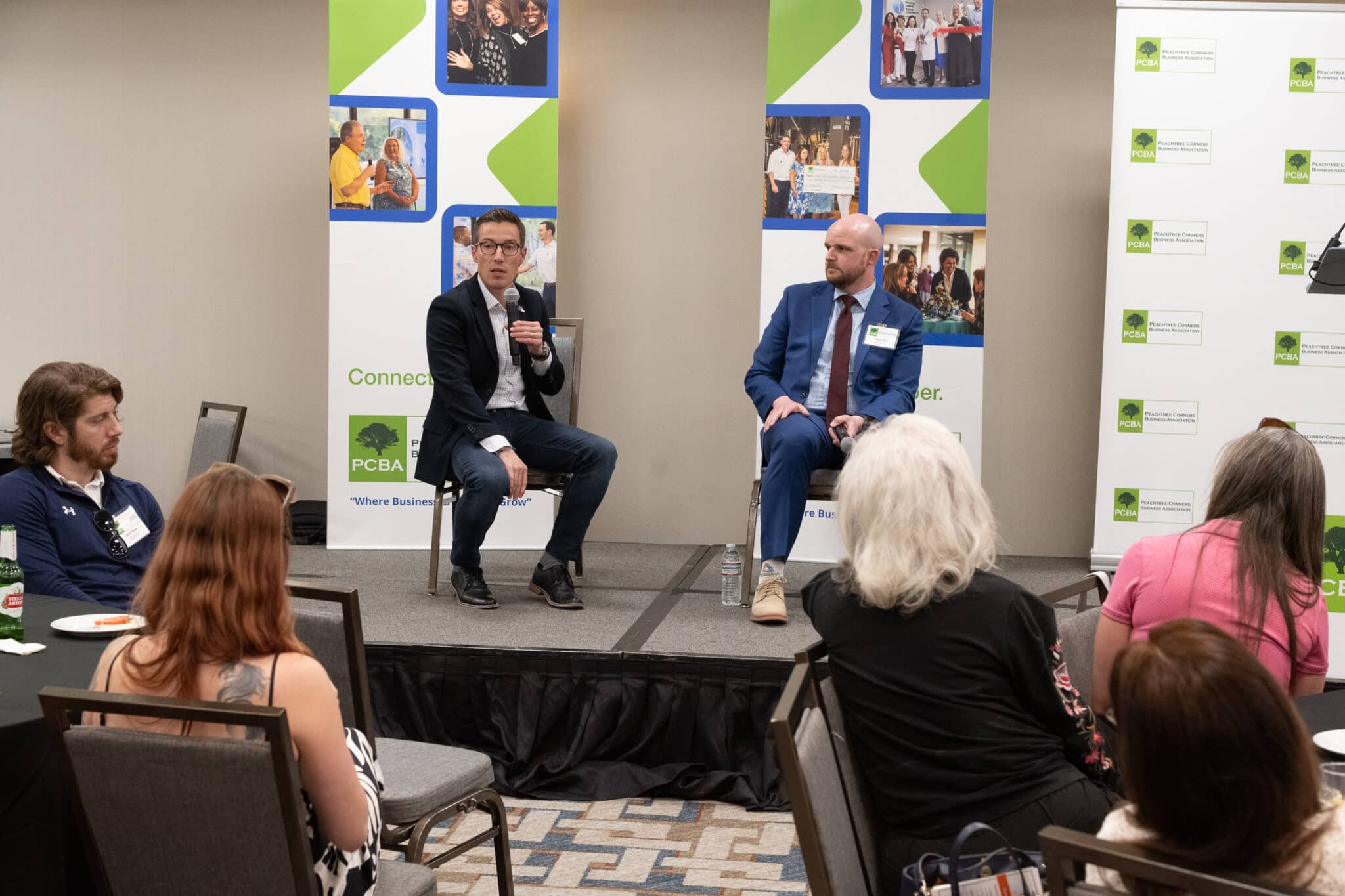
Most residents and business owners in Peachtree Corners probably think they know all about the economic development and strategic planning of Peachtree Corners, but do they really?
Peachtree Corners Business Association invited Peachtree Corners Economic Development Director Betrand Lapoire and Partnership Gwinnett Director of Economic Development Andrew Hickey to its After Hours Speaker Series on March 27 to discuss the city’s growth from a 1971 master plan to a bustling city with 42,000 inhabitants and 40,000 jobs.
Key points included the importance of business retention and expansion, with 24 projects last year creating 1,600 retained jobs, 1,600 new jobs and $250 million in new capital investment.
The Curiosity Lab, a world-class innovation center, was emphasized as a significant attraction. The city’s zoning and infrastructure plans were also discussed, focusing on balancing office and residential development to maintain a vibrant, sustainable community.
Matching jobs to residents
Although Peachtree Corners is just a teenager in terms of being an incorporated city, the foundation for this vibrant, fast-paced economic hub was laid more than 50 years ago by technology pioneer Paul Duke.
“Peachtree Corners was the first master-planned, business innovation technology park in metro Atlanta,” said Lapoire. “It was in response to the brain drain of technology with Georgia Tech graduates leaving the area.”
While the city may have a small-town feel, it’s the largest in Gwinnett County by population, but not land mass, he added.
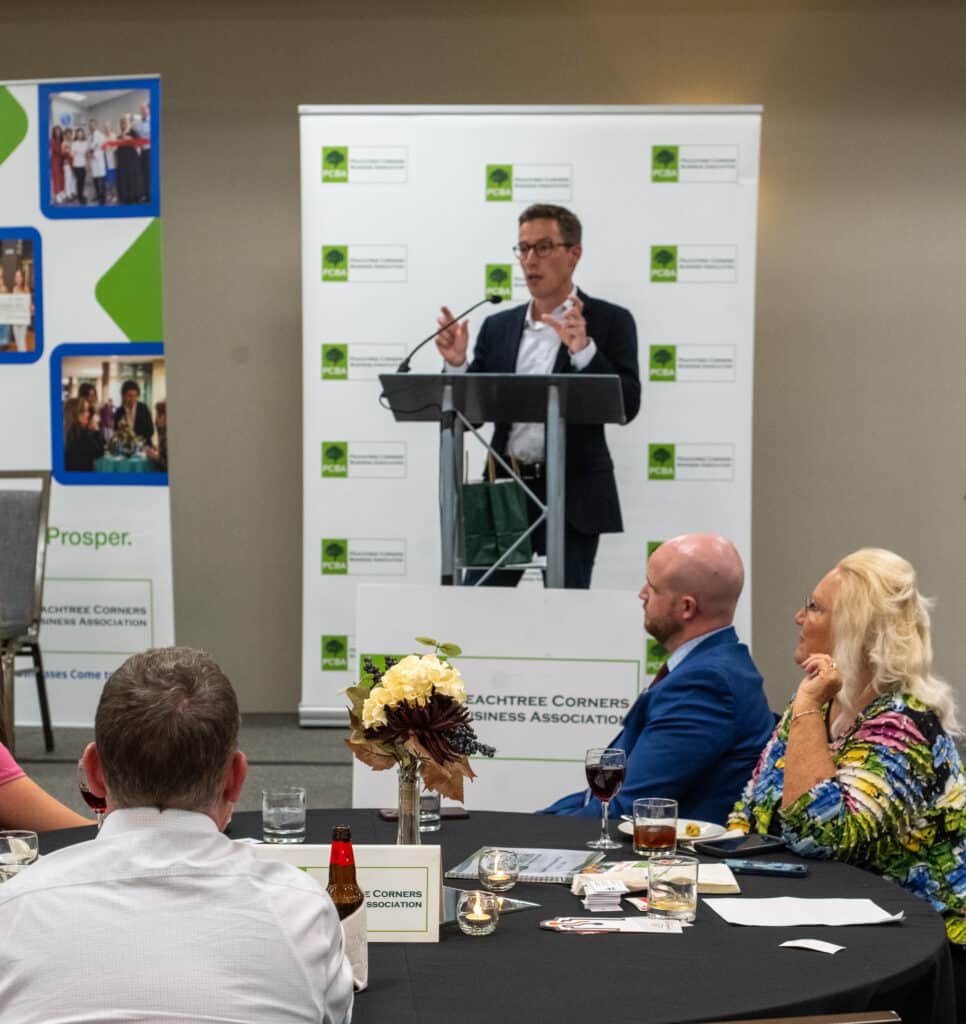
“The city started from a commercial, industrial, R&D base and then was expanded around it,” said Lapoire.
Though home to more than 42,000 residents, most of the jobs in Peachtree Corners are filled by people who live outside the city, he added.
“So we have this interesting mismatch, in a way, although not unusual,” said LaPoire. That creates traffic and transit issues. So that means that one of the solutions is to create more jobs here to fit the profile of the community.”
He presented charts that show professional services, consulting and engineering as the largest job categories. The next tier of businesses are wholesale and manufacturing.
“So we have a good mix of industry,” he said.
A five-year plan
The city has a five-year economic development plan (2023-2028) that outlines strategies for attracting and retaining businesses, with education and workforce development being key components.
Partnership Gwinnett has similar goals as Peachtree Corners, but on a larger scale.
“We are the county’s sales and marketing arm for all 17 cities now, and we receive funding from both municipal sources as well as existing businesses here — both in Gwinnett and outside of Gwinnett as well,” said Hickey.
He shared how Partnership Gwinnett is designed to drive a lot of major corporations toward doing business inside and with Gwinnett County.
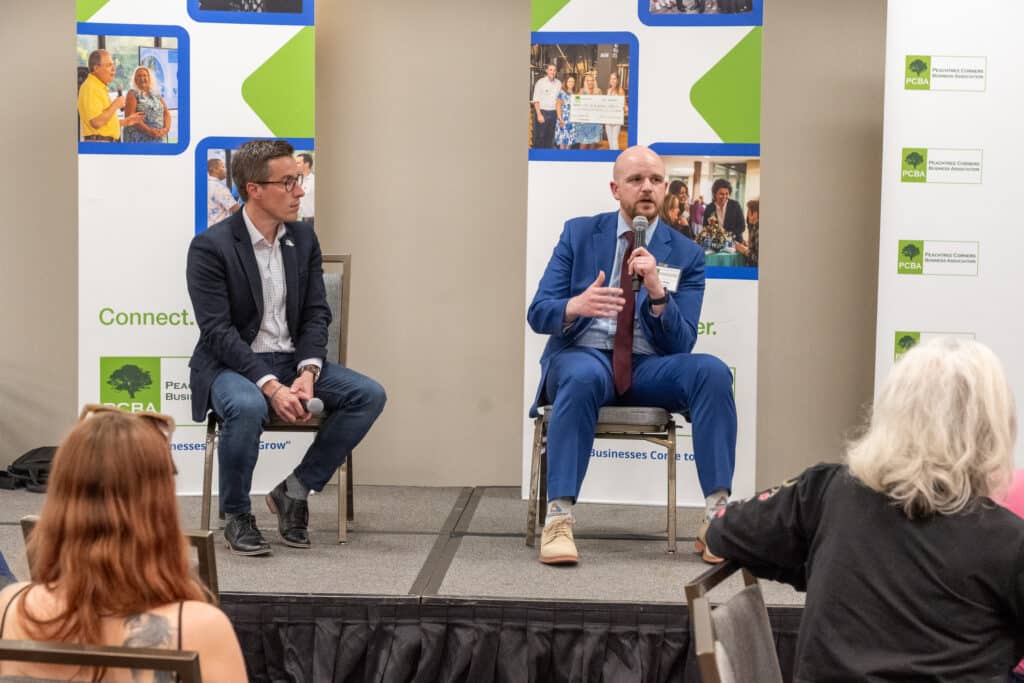
“One of the biggest things that we talk about that I’m sure it seems like most of us here, if you live here, you work here, you understand it. It’s the diversity that exists here in Gwinnett,” he said. “With a diversity index of 85, that means if we walk out of the Hilton here and we say hello to somebody, there’s an 85% chance they’re from a different ethnic or cultural background than ourselves, which to you and I may seem normal because that’s the life that we live in.”
He added that for companies, there’s a tremendous value in that, whether they have stated values, or they’re just making hiring decisions to get a wide range of candidates to fill those roles. Additionally, because of the proximity to Atlanta, Gwinnett County has a great labor draw.
Partnership Gwinnett
Partnership Gwinnett plays a significant role in recruiting businesses, expanding existing companies and developing the workforce. Hickey showed how the organization was involved with more than 24 projects last year.
“A majority of those were expansions, and that is a common thread you’ll see in economic development,” he said. “In business retention, expansion is so vital to working with our existing companies to make sure that they have the resources they need.”
He added that’s what leads to new investment and job creation in the community.
The organization also focuses on redevelopment projects, working with cities and the county to improve infrastructure and community amenities — especially strong educational institutions such Georgia Gwinnett College, Philadelphia College of Osteopathic Medicine and others.
Quality of life
In closing, both men stressed the importance of recruiting companies and developing the workforce, along with one aspect that means a lot but may not be as obvious — quality of life.
“It’s definitely evident that people like to work where they live — the whole live, work play experience,” said Hickey. “I joke that the part that people really have the most questions about, and are most excited to learn about, is new events at The Forum or Gwinnett Place Mall.”
Although they want to know what’s the next major company coming to Gwinnett, people REALLY want to know about how to spend their leisure time.
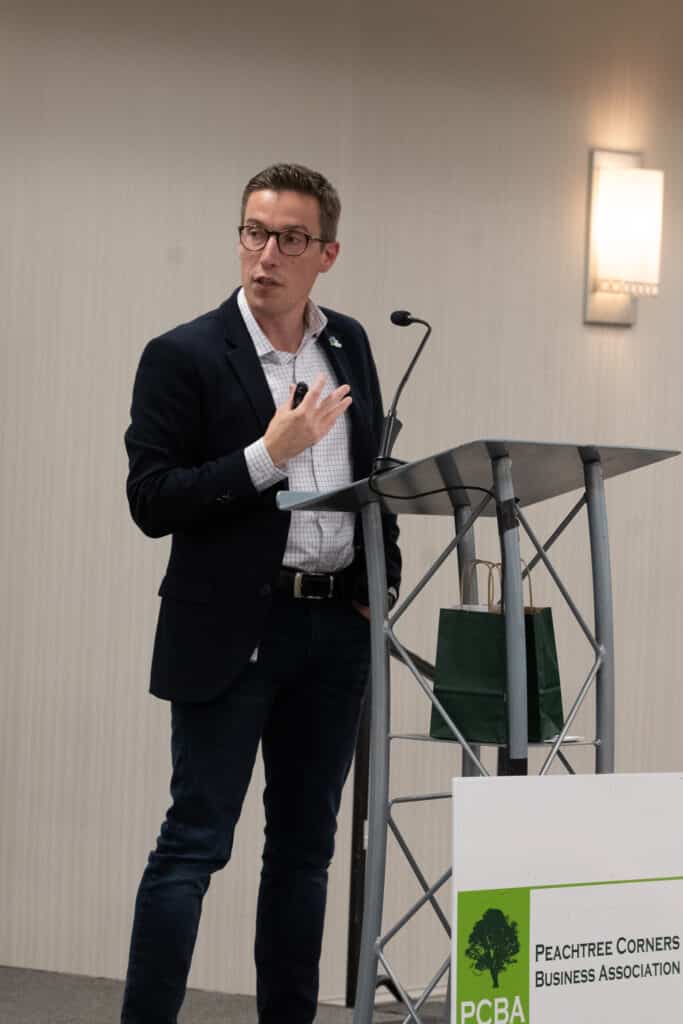
“That speaks to the importance of ensuring that we have a great community,” he said. “So at Partnership Gwinnett we work with all of our cities, and the county government as well, [on] a kind of a best-practices trip.”
He added that the peer tour allows everyone to know what the neighboring communities are doing and share the good news.
“We will take all of these elected officials, but also city staff, to different cities across the Southeast,” he said. “Last year, I believe they went to Huntsville, and have been to Greenville, Chattanooga — all cities that have done some really cool redevelopments that have taken their city to the next level. Our goal is to learn from them.”
Related
Business
Two Peachtree Corners Business Leaders Named Finalists for EY Entrepreneur Award
Published
3 weeks agoon
April 23, 2025
Ernst & Young’s Entrepreneur Of The Year celebrates ambitious entrepreneurs who are shaping the future
Ernst & Young LLP (EY US) recently announced the finalists for the prestigious Entrepreneur Of The Year 2025 Southeast Award, and two local, Peachtree Corners business leaders — David Quirk, president and CEO of DLB Associates Consulting Engineers PC and Erin Hanson, founder and CEO of Guardian Sports — made the list.
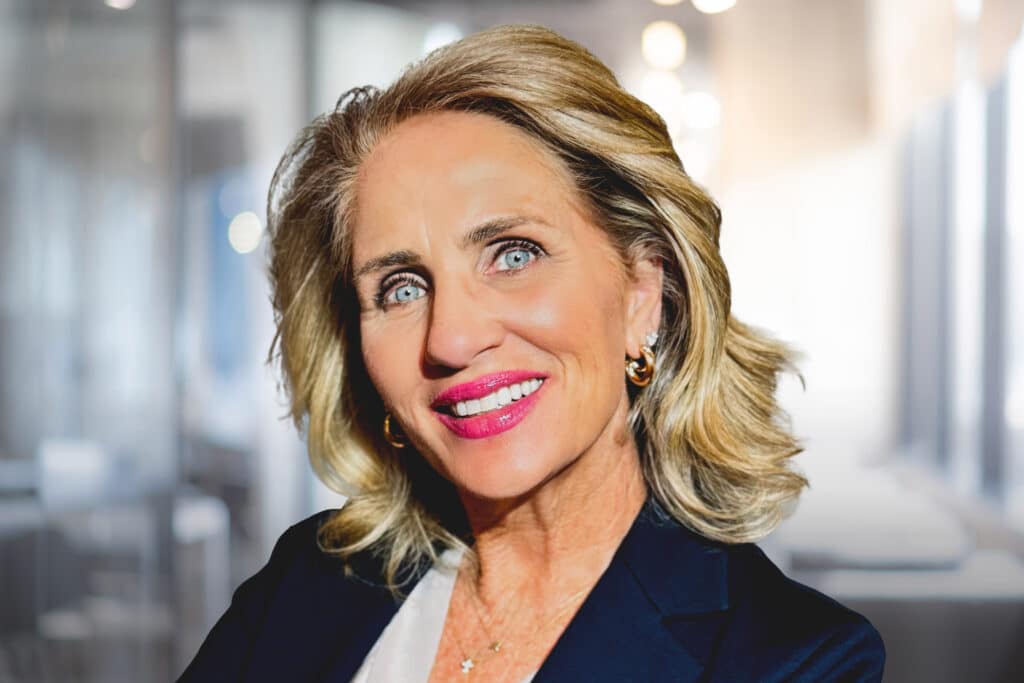
Hanson’s Guardian Sports is a family-owned company dedicated to serving athletes through safety and performance improvements in sports equipment. Major products include the Guardian Cap, PEARL ball and Guardian Infill serving the sports industry.
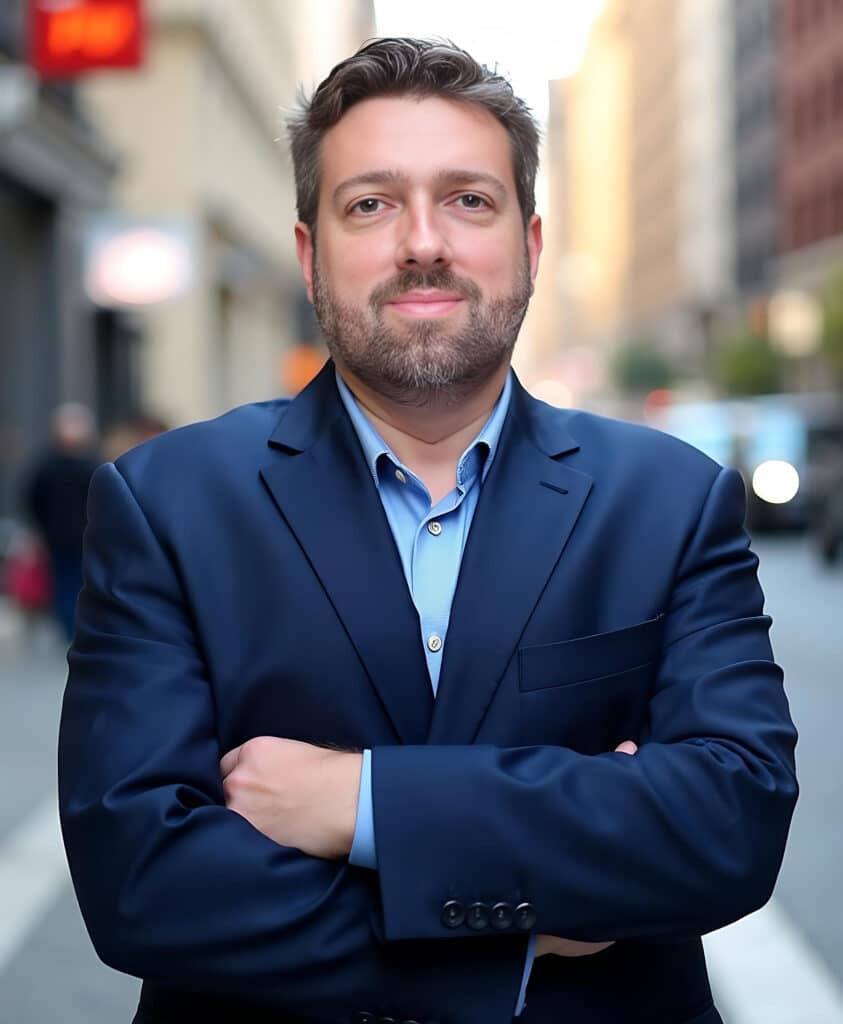
DLB Associates is a U.S.-based consulting engineering firm specializing in mission-critical and complex built environments. With more than 40 years of expertise, DLB delivers innovative, technology-driven solutions in engineering, commissioning and operations worldwide.
Celebrating entrepreneurial leaders
Now in its 40th year, Entrepreneur Of The Year recognizes the bold leaders who disrupt markets through the world’s most ground-breaking companies, revolutionizing industries and making a profound impact on communities. The program honors those entrepreneurs whose innovations shape the future and pave the way for a thriving economy and a hopeful tomorrow.
The Southeast program celebrates entrepreneurs from Alabama, Georgia, North Carolina, South Carolina and Tennessee.
An independent panel of judges selected 36 finalists for their entrepreneurial spirit, purpose, growth and lasting impact in building long-term value.
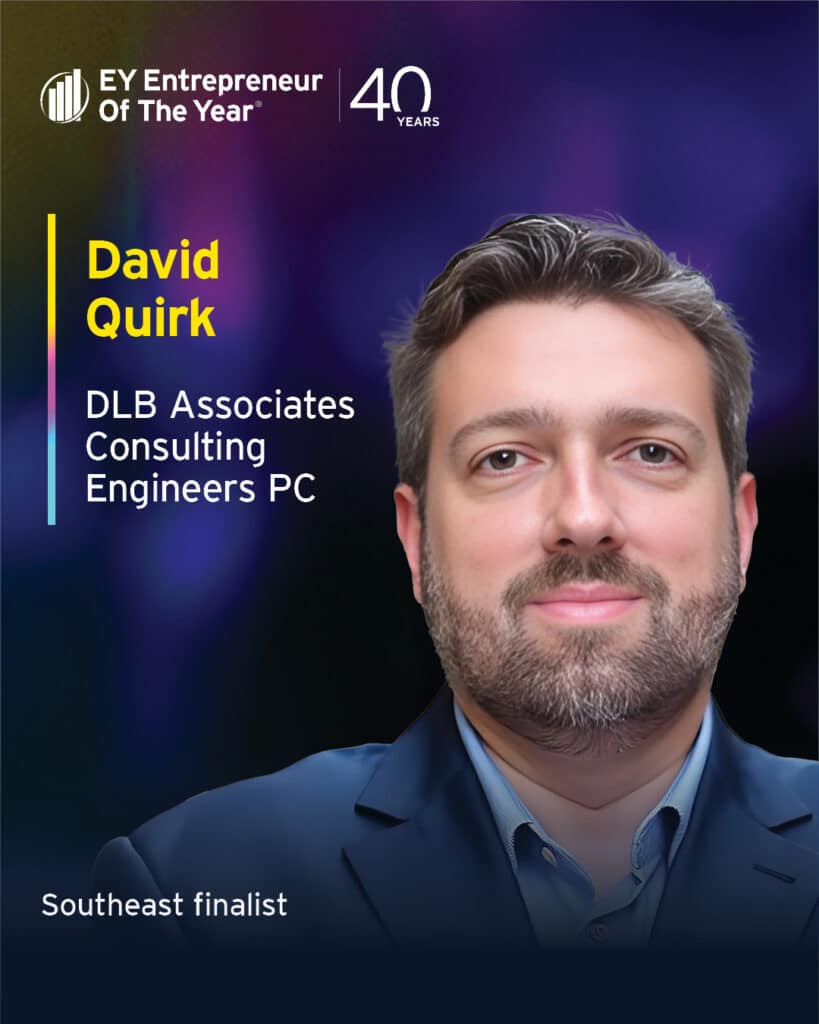
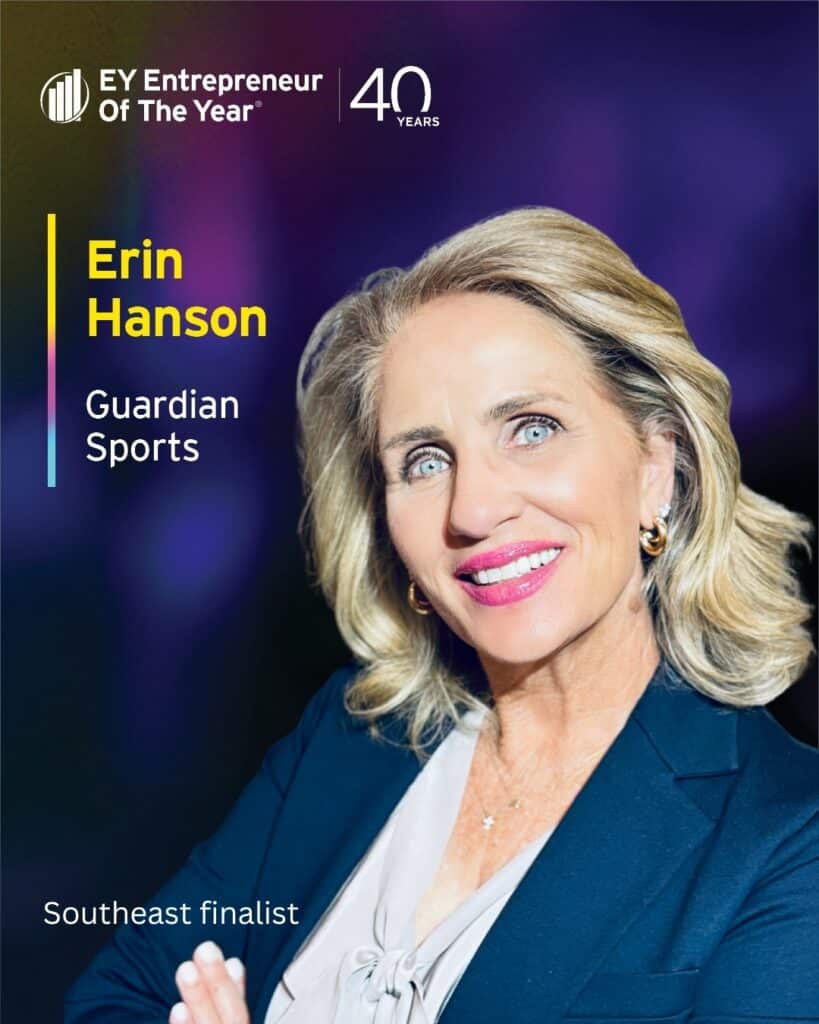
“This year’s finalists are leading examples of innovation, perseverance and resilience, illuminating paths to a brighter future for their industries and communities,” said Chevy Arnold, Entrepreneur Of The Year Southeast Program co-director.
“Their commitment to excellence transforms challenges into opportunities, inspiring us all,” added Kimberly Kicklighter, Entrepreneur Of The Year Southeast Program co-director.
Entrepreneur Of The Year honors many different types of business leaders for their ingenuity, courage and entrepreneurial spirit.
The program showcases original founders who bootstrapped their business from inception or who raised outside capital to grow their company; transformational CEOs who infused innovation into an existing organization to catapult its trajectory; and multigenerational family business leaders who reimagined a legacy business model to strengthen it for the future.
Including Quirk and Hanson, the 2025 Southeast finalists are:
- Marc Hodulich | 29029 | Atlanta, Georgia
- Damon Stafford | Alpine Intel | Charlotte, North Carolina
- Lou Hensley | Aspida | Durham, North Carolina
- Matthew Dent | Buffalo Rock Company | Birmingham, Alabama
- Melanie Little | Colonial Pipeline Company | Alpharetta, Georgia
- Will Bartholomew | D1 Training | Franklin, Tennessee
- Rene Diaz | Diaz Foods | Atlanta, Georgia
- David Quirk | DLB Associates Consulting Engineers PC | Peachtree Corners, Georgia
- Markus Scott | EyeQ Monitoring | Atlanta, Georgia
- Jon Gosier | FilmHedge | Atlanta, Georgia
- John Fitzpatrick | Force Marketing | Atlanta, Georgia
- Dr. Barry Patel | Galt Companies | Atlanta, Georgia
- Dr. Wade Smith | Galt Companies | Atlanta, Georgia
- Charles Gillespie | Gambling.com Group | Charlotte, North Carolina
- Kevin McCrystle | Gambling.com Group | Charlotte, North Carolina
- Mike Griffin | Griffin Brothers Companies | Cornelius, North Carolina
- Erin Hanson | Guardian Sports | Peachtree Corners, Georgia
- Dan Beem | Hissho Sushi | Charlotte, North Carolina
- Aaron Siegel | Home Team BBQ | Charleston, South Carolina
- Marc Murphy | Ignite Digital Services | Charleston, South Carolina
- Miller Chalk | Inglett & Stubbs, LLC | Mableton, Georgia
- Liza Rodewald | Instant Teams | Southern Pines, North Carolina
- Stephen Andresen | McClancy Foods & Flavors | Fort Mill, South Carolina
- Travis LeFever | Mission Mobile Medical Group | Greensboro, North Carolina
- Cyrus Mojdehi | Northway Homes | Charlotte, North Carolina
- Connor Ryan | NutraSky | Alpharetta, Georgia
- Fritz Owens | OTR Solutions | Roswell, Georgia
- Christopher Chuang | Relay, Inc. | Raleigh, North Carolina
- Kurt Jacobus | restor3d, Inc. | Durham, North Carolina
- Tom Kendrot | Shearwater Health | Nashville, Tennessee
- Teak Shore | Southern Lighting Source | Cumberland, Georgia
- Cindy Eckert | Sprout Pharmaceuticals | Raleigh, North Carolina
- Bryan Moore | TalkShopLive Inc. | Nashville, Tennessee
- Tina Moore | TalkShopLive Inc. | Nashville, Tennessee
- Igor Marinelli | Tractian | Atlanta, Georgia
- Joan Butters | Xsolis | Franklin, Tennessee
You can learn more about the finalists at ey.com/en_us/entrepreneur-of-the-year-us/southeast/winners-finalists.
Regional award winners will be announced on June 25 during a special celebration. The winners will then be considered by the national independent panel of judges for the Entrepreneur Of The Year National Awards, which will be presented in November at the annual Strategic Growth Forum®, one of the nation’s most prestigious gatherings of high-growth, market-leading companies.
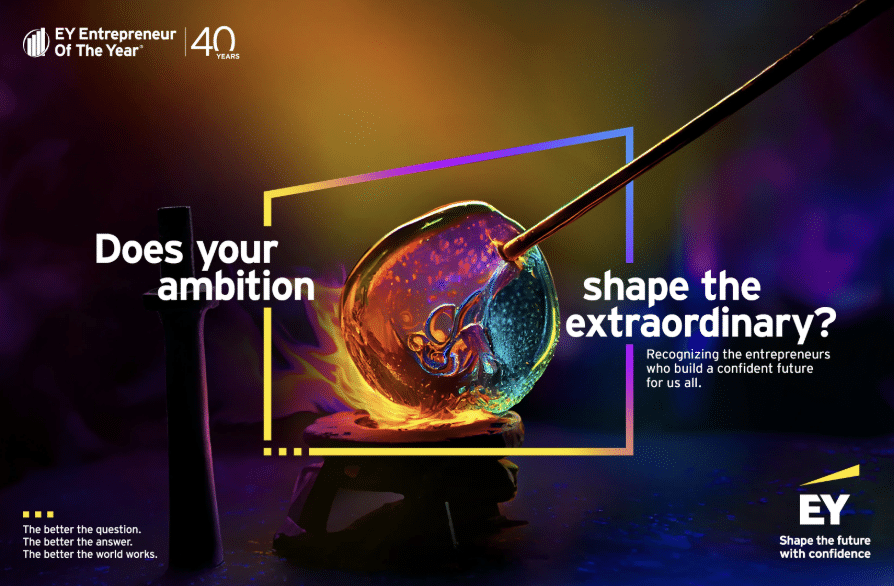
About Entrepreneur Of The Year
Founded in 1986, Entrepreneur Of The Year has celebrated more than 11,000 ambitious visionaries who are leading successful, dynamic businesses in the U.S., and it has since expanded to nearly 60 countries globally.
The U.S. program consists of 17 regional programs whose panels of independent judges select the regional award winners every June. Those winners compete for national recognition at the Strategic Growth Forum® in November where national finalists and award winners are announced.
The overall national winner represents the U.S. at the EY World Entrepreneur Of The Year™ competition.
For more about the award, visit ey.com/us/eoy.
Related
Business
SCB Construction Group Partners with CGA Reps on New Peachtree Corners HQ
Published
4 weeks agoon
April 15, 2025
SCB Construction Group, freshly rebranded from SteelCo, secures construction project with CGA Reps for new office HQ in Peachtree Corners
SCB Construction Group has announced a strategic partnership with CGA Reps to build a new office headquarters in Peachtree Corners. The project, encompassing approximately 26,000 square feet of innovative workspace, marks a significant milestone in advancing CGA Reps’ corporate vision while showcasing SBA Construction Group’s commitment to delivering transformative construction solutions.
In collaboration with Oakley Real Estate Partners — serving as developers of the project on behalf of CGA Reps — this venture reflects a united effort to bring cutting-edge design (from Smallwood architecture firm) and operational excellence to the commercial kitchen equipment industry.
The announcement follows several high-profile projects for SCB Construction Group in 2024, including a 72,500-square-foot manufacturing center and headquarters for Process Equipment & Controls, an impressive interior build-out for Courtesy Ford Conyers’ commercial service center and the Phase 1 completion for StoreEase Loganville — recently honored as a 2024 Smart Facility of the Year by Modern Storage Media.
A bold new chapter for CGA Reps
The new 25,890-square-foot headquarters is designed to be more than just a workplace — it is envisioned as an inspiring environment that serves both client engagements and employee creativity. CGA Reps is recognized as an industry expert in commercial kitchen equipment, representing leading manufacturers, warehousing, distributing and installing everything from fryers to commercial walk-in freezers.
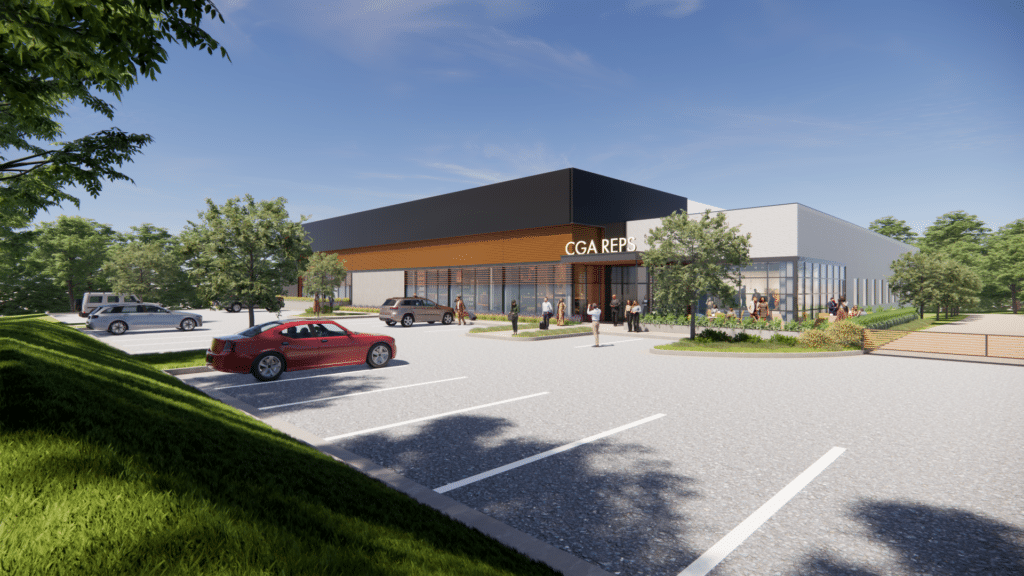
The facility’s design reflects this expertise, featuring a dedicated approximately 9,000-square-foot showroom kitchen that will host equipment demonstrations, tradeshows and webinars. This dynamic space will allow CGA Reps to showcase its comprehensive product range and provide clients with hands-on experiences of the latest commercial kitchen innovations.
A standout feature of the project is its innovative approach to stormwater management. With the site comprising only three acres, sufficient space for a traditional detention pond does not exist. To overcome this challenge, the design includes an underground detention system located beneath the truck court to efficiently handle all stormwater runoff.
This solution not only maximizes the use of the available land but also reinforces CGA Reps’ commitment to sustainable practices.
“We are excited to embark on this project with CGA Reps,” said Jay Bailey, CEO of SCB Construction Group. “This partnership underscores our commitment to customer excellence in design and construction, and it is a testament to the trust our clients place in our ability to deliver projects that not only meet but exceed expectations.”
Delivering excellence through proven expertise
SCB Construction Group’s track record in 2024 has been nothing short of remarkable. Earlier in the year, the company completed a 72,500 square foot manufacturing center for Process Equipment & Controls, integrating office space within a dynamic production facility.
This project was celebrated for its innovative design that balanced operational efficiency with a modern aesthetic, utilizing IMP panels to mimic tilt-up concrete, setting new standards for manufacturing environments.
Similarly, the interior build-out for Courtesy Ford Conyers’ commercial service center demonstrated SCB Construction Group’s ability to transform conventional spaces into functional and attractive environments that cater to both customer and staff needs.
The company’s commitment to quality and precision was again evident in the successful Phase 1 completion for StoreEase Loganville. This project, which recently earned the distinction of a 2024 Smart Facility of the Year by Modern Storage Media, highlights SCB Construction Group’s forward-thinking approach to construction and design, incorporating smart technologies and design that enhance sustainability and operational efficiency.
A rebranding that reflects a vision for the future
In a move that signals its evolution and growth, SCB Construction Group has recently rebranded from its former identity, SteelCo Buildings, as it spins off its construction division. This strategic rebranding is not merely cosmetic — it represents a renewed commitment to capabilities, credibility and client-focused service.
The refreshed brand is anchored by a new tagline “Deep Expertise, High Expectations” and a clear brand promise that communicates the company’s mission: to craft exceptional construction experiences based on precision, innovation and trust.
“Our rebranding is about more than just a new name or logo; it’s a renewed promise to our clients and communities,” explained Robert Lee, marketing director at SCB Construction Group. “We believe that our updated brand identity, including our invigorated tagline and mission statement, encapsulates our dedication to pushing the boundaries of design and construction. It reflects our commitment to creating spaces that are as inspiring as they are functional.”
Transforming spaces to inspire and connect
The new headquarters for CGA Reps is expected to become a landmark facility in Peachtree Corners. Beyond its impressive architectural design and advanced construction techniques, the building is planned as a hub for innovation and collaboration.
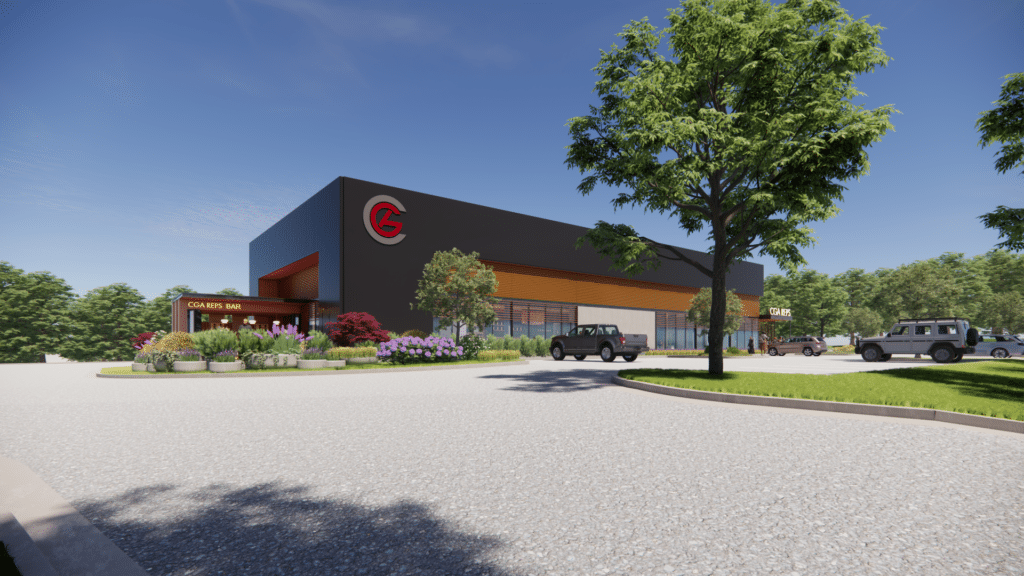
The interior build-out will include dynamic client reception areas, interactive meeting rooms, and dedicated spaces designed to foster creativity and teamwork among employees. The layout is crafted to ensure that every area of the facility contributes to a productive and inspiring work environment.
“By investing in this state-of-the-art facility, CGA Reps is making a strong statement about the future of work,” said Bryan Young, VP of construction at SCB Construction Group. “Our team is dedicated to designing and building spaces that not only serve the immediate needs of our clients but also create environments that motivate and inspire. The new headquarters will be a testament to that vision.”
Looking ahead
The partnership between SCB Construction Group and CGA Reps marks a significant step forward for both companies. As SCB Construction Group continues to build on its legacy of excellence and innovation, this project is poised to set a new benchmark for modern office headquarters design in the region.
With a strategic focus on creating spaces that inspire, connect and drive success, the future looks promising for both SCB Construction Group and its esteemed partner, CGA Reps.
For more information on the new headquarters project or to learn more about SCB Construction Group’s portfolio, visit scbcg.com.
Related
Read the Digital Edition
Subscribe
Keep Up With Peachtree Corners News
Join our mailing list to receive the latest news and updates from our team.
You have Successfully Subscribed!

Katherine Lafourcade — A Journey of Passion, Resilience and Giving Back

Digital Edition

PCBA Announces 2025 Scholarship Winner

Official City Merchandise Line Debuts This Saturday at Town Green

Paul Duke STEM High School Student Earns CGO Scholarship

World Blood Donor Day Starts Here: Theo’s Miracle, Katherine’s Mission [Podcast]

Executive Function: A Tribute to Working Moms

Peachtree Corners Grows Business Opportunities Through Economic Development

City of Peachtree Corners Awarded Certificate of Achievement From GFOA for Seventh Straight Year

Simpson Elementary Marks Exceptional Children’s Week

Executive Function: A Tribute to Working Moms

Official City Merchandise Line Debuts This Saturday at Town Green

Peachtree Corners Grows Business Opportunities Through Economic Development

Digital Edition

World Blood Donor Day Starts Here: Theo’s Miracle, Katherine’s Mission [Podcast]

Paul Duke STEM High School Student Earns CGO Scholarship

Light up the Corners [Video]

Capitalist Sage: Business Leadership in Your Community [Podcast]

Cliff Bramble: A Culinary Adventure through Italy

Top 10 Brunch Places in Gwinnett County

A Hunger for Hospitality

THE CORNERS EPISODE 3 – BLAXICAN PART 1

Top 10 Indoor Things To Do This Winter

The ED Hour: What it takes to Remove Barriers from Education






